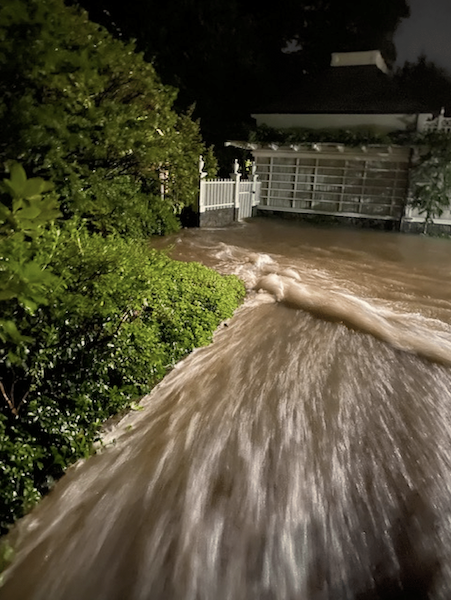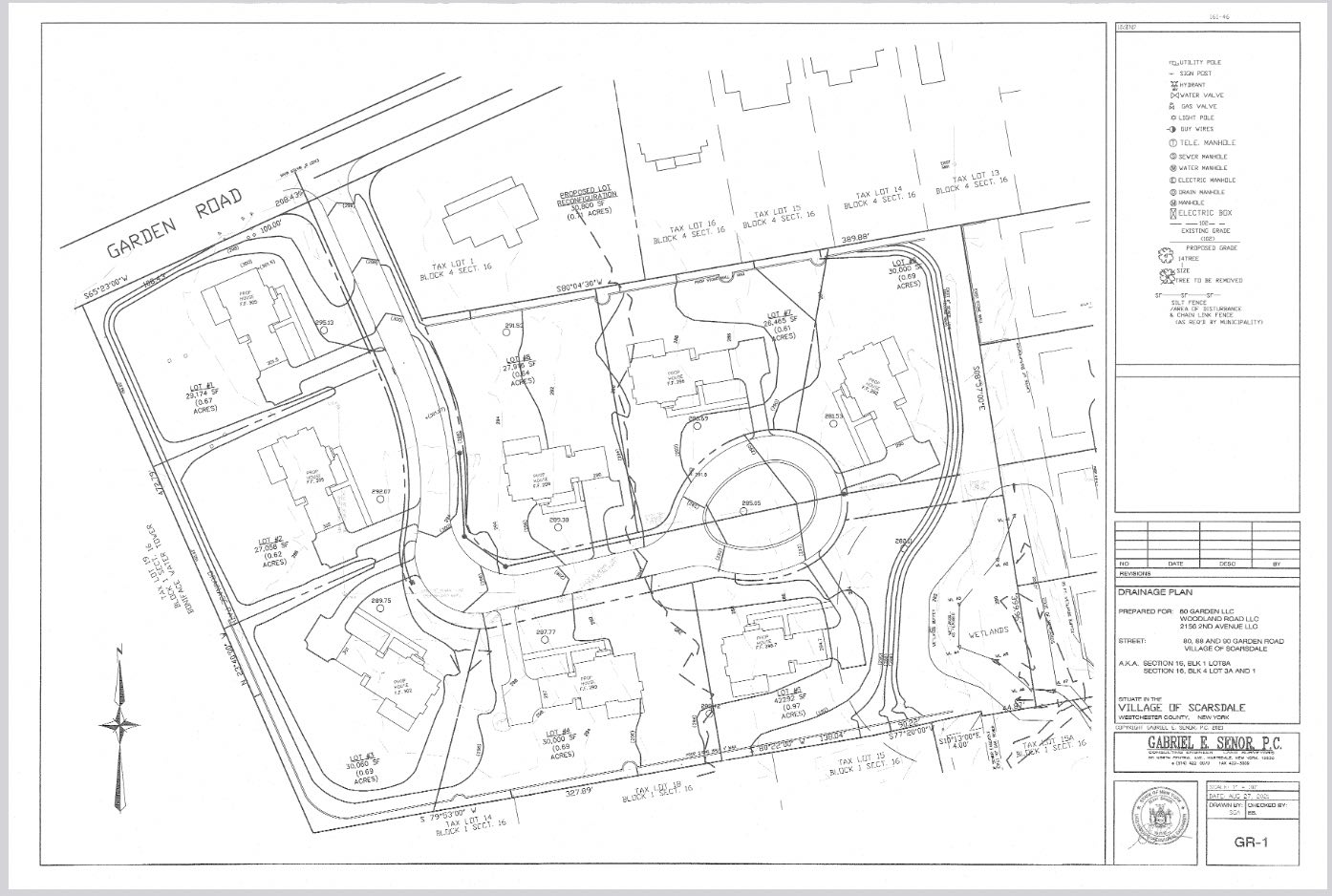Despite Frequent Flooding, Developer Is Undeterred From Plans for an 8 Home Subdivision on Garden Road
- Tuesday, 06 August 2024 11:56
- Last Updated: Thursday, 08 August 2024 12:48
- Published: Tuesday, 06 August 2024 11:56
- Joanne Wallenstein
- Hits: 5171
 Even as the Village contemplates millions of dollars in stormwater remediation projects, the Scarsdale Planning Board continues to entertain highly controversial development projects in a flood-prone areas. On the agenda for a special meeting on September 19 is a proposed 8 home development at 80 Garden Road that has been the subject of meetings and substantial objections from property owners since 2018.
Even as the Village contemplates millions of dollars in stormwater remediation projects, the Scarsdale Planning Board continues to entertain highly controversial development projects in a flood-prone areas. On the agenda for a special meeting on September 19 is a proposed 8 home development at 80 Garden Road that has been the subject of meetings and substantial objections from property owners since 2018.
The fact that homeowners adjacent to the site already experience significant flooding seems to do nothing to dissuade the Board Chairman and the Village Engineer from continuing to invite the applicants to additional hearings and even specially-scheduled additional meetings to entertain their proposal. Why a special hearing for this application? Acting Village Manager Alexandra Marshall explained, "Special meetings are typically held for complex applications, especially if extensive public comments are anticipated. If such applications were added to regular meetings, it would be inconvenient to other applicants and members of the public waiting to be heard regarding other applications."
As recently as July 18, 2024, the Village Board held a work session to review plans for a major public works project to alleviate flooding in the Sheldrake Watershed, just downstream from the proposed development. Furthermore the Village Engineer and Superintendent of Public Works announced that on Cushman, Garden, Sheldrake and Willow Roads, streets that lie directly behind and downstream from the Garden Road site the Village is doing an analysis of the stream, creating a hydraulic model and is close to making some recommendations for work to be done.
So why is the Planning Board continuing to hear claims that an 8-house subdivision in a soggy area with a high water table will not exacerbate the issues?
As described in our previous article in March 2024, “The eight-home development would be on a private road in a cul de sac. Each home would have its own water well as the Village does not have adequate water to supply the homes with water when there is also demand for water during a fire emergency. Each home would also have a swimming pool.
Since the area has a high water table, the developer, Steve Kessner, is proposing to truck in tons of landfill to raise the ground level by four feet, and contain the fill with four foot high retaining walls on the north and south sides of the property. This will allow the builder to place the underground pipes in the fill, rather than deeper underground where they could be infiltrated by groundwater.
Due to the high water table, the builder can’t use drywells for water retention so he is proposing to build an underground retention system with a slow release system to allow water to be time released.”
The latest reports from the applicants seek to answer questions about the quality of the tons of landfill, about the stormwater runoff and about the removal of hundreds of trees. They also address how downstream neighbors would be affected by runoff during the potential construction. You can see the reports from their experts here.
Over the course of six years of meetings, neighbors have written detailed letters about why the plans would put their homes at additional risk. As we have seen with other applications that will negatively impact neighborhoods, local residents are called on over and over again to attend lengthy meetings to voice their concerns. Sometimes public comment is not even permitted.
Here are comments from Helen Maccarino of Cushman Road who has studied the proposal. She says, “Any multi-home development should be discouraged in a flood prone area and this includes 80 Garden. The Village stormwater management infrastructure in the Garden/Cushman/Willow area has been designated as a high priority for remediation because the system struggles to handle the current runoff volume. But it is years away from being improved. Given this situation, I am stunned that the Village seems willing to consider an 8-house subdivision here before the infrastructure is fixed.
In addition to being in a flood-prone area, the site is simply unsuitable for development. Not only does a portion of the site include wetlands, the ground water table is so high that it is impossible to build 8 new houses on the site as is. The developer’s solution: clear cut the entire 5+ acres of all 424 trees, have 25 truckloads of fill brought in each day for 3-4 months to raise the terrain by 4 feet, and erect a 4-6 ft high retaining wall (placed inside the required minimum setback) to hold all the fill in place. The NYS Dept of Conservation cautions that these same exact actions can change drainage patterns and exacerbate flooding. The new homes won’t flood because they will sit 4 feet higher than all the neighboring homes in the area. This engineering decision dumps the flooding risk on rest of us. Once all the trees are gone and the terrain is raised, there is no going back. The damage is irreversible.
We talk about climate change and what we can do to better protect our environment but we lack the will to make the hard decisions. Large subdivisions in flood prone areas will not bring us closer to that goal. This project is so big and our infrastructure is so inadequate that there's not even enough water to meet the demand of the proposed new houses so wells have to be dug for each house. This is an ill-conceived project that must be more thoughtfully designed, have a smaller footprint, be less destructive and more respectful of the environment. We deserve better.
Not to mention the quality of life issues that we will have to endure during the years it will take from start to finish. Just clearing and prepping the site will take a year. Constant noise, dirt, fumes, traffic, etc. every day except Sundays. It is unfair for the neighbors to have to live under these conditions for so long. Maybe we can get a property tax rebate during the life of the project?”
Having attended many of these meetings we are waiting for the Chairman of the Planning Board to call for a vote. There is ample evidence that this proposal will put neighbors at additional risk and do nothing to improve a very dicey situation downstream. And if the Village fears a lawsuit from the developers, the Village should weigh that concern against the prospect of a lawsuit from neighbors who will be left with few options to preserve the value of their homes. The Planning Board would then have time to consider infrastructure improvements to safeguard the Village rather than spending years evaluating the negative impacts of potential development.
The Planning Board has the authority to permit or deny subdivision applications. In this case, the Village’s infrastructure cannot support the homes, so no water service can be provided. There are well documented incidents of flooding on and around the site which demonstrate that it is unsuitable for development. Furthermore, in six years of meetings the applicants have failed to prove that the subdivision will not cause further harm. What does it take for the Planning Board and Village Engineer to simply say “No?”






